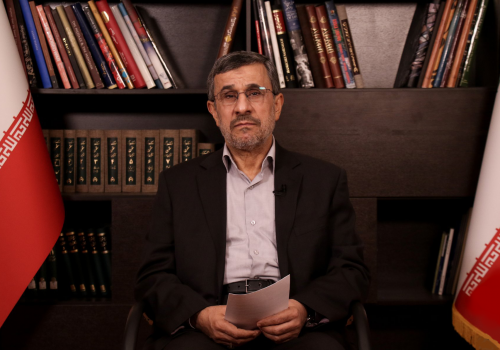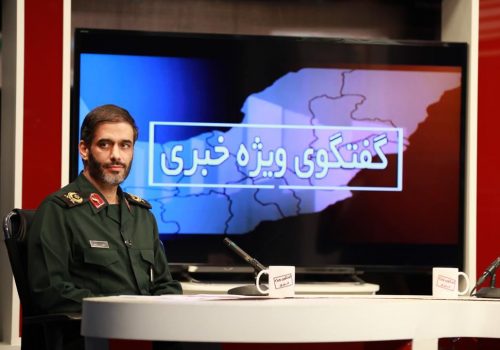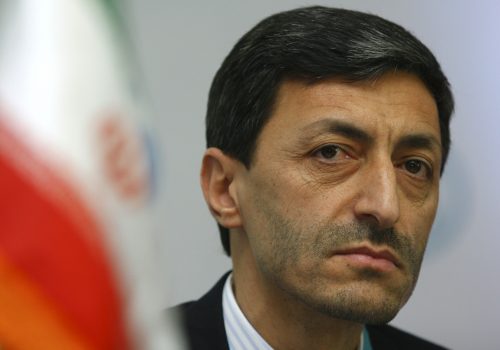Larijani has credentials but not charisma as Iran’s presidential candidate
Ali Larijani is a veteran official in the Islamic Republic whose long service in a variety of key posts would make him a plausible—if not especially charismatic—candidate in Iran’s upcoming June 18 presidential elections.
A former national security adviser and nuclear negotiator whose views have become more centrist in an Iranian context over the years, Larijani reached out unsuccessfully to the George W. Bush administration for talks on Iran’s nuclear program in 2006-2007. Later, he helped defend the 2015 Joint Comprehensive Plan of Action (JCPOA) from hardline criticism as speaker of parliament.
Larijani, in a 2015 interview with me, turned out to be prescient about the fate of the JCPOA, from which the Donald Trump administration withdrew unilaterally in 2018. Asked then what would happen if a future US president left the deal, Larijani said, “Maybe this can hurt parts of the deal but I don’t think this will be in the interests of the United States. I’m not sure that the other countries involved in the negotiations would like the idea. This will make Iran change its mind and not to be that committed to its obligations.”
Indeed, Iran has moved substantially away from its nuclear commitments over the past eighteen months—a process it says is reversible, but only if the Joe Biden administration lifts the punishing economic sanctions Trump imposed in violation of the deal. The US and Iran remain in a standoff about sequencing a mutual return to compliance even though diplomats on both sides would seem to prefer a resolution before Iran changes presidential administrations and brings in a new and possibly pricklier group of negotiators.
The son of a famous ayatollah and the brother of a former judiciary chief and three other well-placed figures, Larijani, age sixty-three, has been in the thick of the Islamic Republic’s politics and policymaking for more than three decades. A cerebral intellectual, who wrote his doctoral dissertation about the eighteenth century German philosopher, Immanuel Kant, Larijani served in the Islamic Revolutionary Guards Corps (IRGC), headed Iran’s state broadcasting service for a decade, strictly controlling its content, then ran for president unsuccessfully in 2005, garnering only single-digit support in the first round. Populist fire breather Mahmoud Ahmadinejad ultimately won in a second round, defeating a former president in Hashemi Rafsanjani.
Larijani got the job of national security adviser as a consolation prize but quit in 2007 after Ahmadinejad stymied several efforts at achieving an agreement with international powers over Iran’s advancing nuclear program. Larijani made a political comeback in the 2008 parliamentary elections, winning easily in the clerical stronghold of Qom. He served as speaker of that body for twelve years, providing important support to President Hassan Rouhani’s administration and suggesting that Ali Salehi, a top Iranian nuclear expert and former foreign minister, join the team that negotiated the JCPOA. Salehi clicked with then US Energy Secretary Ernie Moniz—a fellow Massachusetts Institute of Technology graduate—helping the talks succeed.
Larijani left parliament in 2020 after declining to run again in elections that year, which were swept by more conservative candidates. His successor as speaker was Mohammad Baqer Qalibaf, another regime stalwart and unsuccessful presidential candidate who is also said to be weighing another run this year.
A decision to enter the campaign this spring probably rests on whether Supreme Leader Ali Khamenei gives Larijani the nod and no other figure of stature from the centrist or reformist camps steps forward. Like outgoing president Rouhani, Larijani is someone Khamenei trusts to represent Iran without compromising the regime’s basic tenets of religious supervision over society and independence from foreign powers. However, Larijani’s family—particularly his brother, Sadegh, the former judiciary chief—has been tarred by accusations of copious corruption that could lead Khamenei to look for a fresher face. Larijani’s other brothers—Mohammad-Javad, Baqer, and Fazel—have all had plum positions as head of Iran’s human rights council, deputy minister of health, and cultural attaché in Canada, respectively.
In the four interviews I conducted with Larijani over the years, he has presented a standard worldview of Iran as the aggrieved party in international relations. In our first interview in 2006, he went so far as to accuse Donald Rumsfeld, a Middle East envoy for Ronald Reagan in between stints as US defense secretary, of visiting Iraqi dictator Saddam Hussein to encourage him to invade Iran before the start of the Iran-Iraq war in 1980. In fact, Reagan didn’t take office until 1981 and Rumsfeld didn’t visit Baghdad until 1983 when the US did, indeed, tilt toward Iraq in that cataclysmic conflict.
In the 2006 interview, Larijani explained that Iran’s experience of having Western contracts cancelled after the 1979 revolution was the reason it had to retain the ability to enrich uranium on its own soil—long a point of contention for the US, Israel, and other countries suspicious of Iran’s nuclear intentions. Iran had had a 10 percent stake in a French company, Eurodif, Larijani said, but never got “one gram of fuel… I think if a country has just a little brain, it would not depend on the fuel from another country,” he said.
At the same time, he was angling for talks with the US and so tried a bit of Persian flattery, calling then White House national security adviser Stephen Hadley a “logical thinker.” However, by 2008 he had soured on Hadley and the Bush administration. “My idea has changed,” Larijani said. “I didn’t see him perform a miracle during this time. There were some good opportunities that emerged but unfortunately no good responses from them.” Instead, the Bush administration insisted that Iran forgo uranium enrichment on its soil.
In our next interview in 2012, when Iran was under an initial massive wave of US-led sanctions as President Barack Obama sought to push Iran back into negotiations, Larijani asserted that Iran could survive the loss of oil sales to Europe and the sharp reduction in the value of its currency. “We are used to hardship,” he said. “When the [Iran-Iraq] war was imposed on us, it was much harder and the whole world was supporting Saddam [Hussein]… Did they succeed to get any part of our territories? Because our people are very resistant to this.”
This support for “resistance” could make Larijani appealing to Khamenei and conservatives, while Larijani’s support of negotiations with the West could make him an acceptable compromise choice for Iranian pragmatists and reformers. Whether Iran’s cynical electorate would go for him is another question.
Barbara Slavin is director of the Future of Iran Initiative at the Atlantic Council. Follow her on Twitter: @BarbaraSlavin1.
Image: Iran's parliament speaker Ali Larijani speaks during a news conference in Baghdad December 24, 2014. REUTERS/Thaier Al-Sudani


